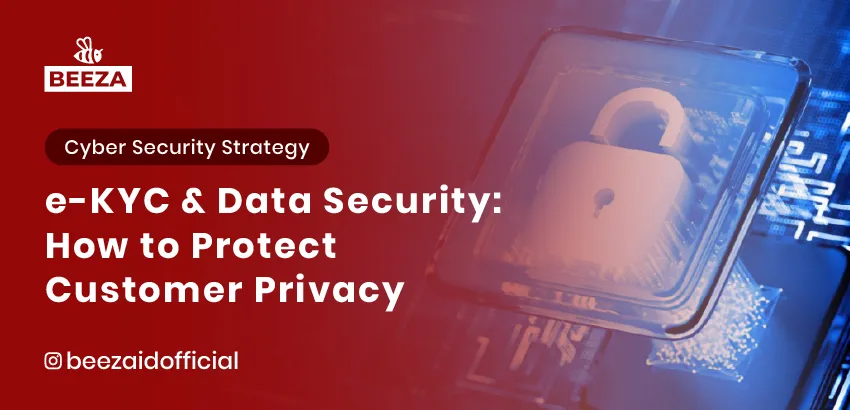
In today’s digital world, verifying customer identities online has become a necessity, especially in industries like banking, fintech, e-commerce, and telecommunications. One of the most effective solutions is electronic Know Your Customer (eKYC), which allows businesses to verify customer identities quickly and remotely.
However, as eKYC relies on sensitive personal data, businesses must ensure that customer privacy and data security are not compromised. Cyber threats, data breaches, and identity theft are growing concerns, making it essential to implement robust security measures in eKYC processes.
So, how can businesses protect customer privacy while leveraging eKYC? This article explores the risks, best practices, and solutions to enhance data security in digital identity verification.
What Is eKYC and Why Is It Important for Data Security?
eKYC (Electronic Know Your Customer) is a digital identity verification process that uses technologies such as biometrics, artificial intelligence (AI), and document verification to authenticate customers.
Why Is eKYC Important?
✅ Faster customer onboarding without physical verification.
✅ Reduced fraud and identity theft through advanced authentication.
✅ Lower operational costs compared to traditional KYC methods.
✅ Regulatory compliance with financial and data protection laws.
Because eKYC collects and processes sensitive customer data, businesses must implement strong security measures to prevent unauthorized access and misuse.
Key Data Security Challenges in eKYC
1. Cybersecurity Threats & Data Breaches
eKYC systems store sensitive customer data, making them a prime target for hackers. Cyberattacks can lead to data breaches, identity theft, and financial fraud.
Solution:
✔ Use end-to-end encryption to secure data transmission.
✔ Implement multi-factor authentication (MFA) for added security.
2. Third-Party Data Misuse
Many businesses rely on third-party vendors for eKYC services. If these vendors lack strong security measures, customer data can be misused, leaked, or sold.
Solution:
✔ Choose eKYC providers that comply with GDPR, ISO 27001, and local data protection laws.
✔ Conduct regular security audits to ensure vendor compliance.
3. Deepfake & Synthetic Identity Fraud
Cybercriminals use deepfake technology and AI-generated identities to bypass eKYC verification. This can lead to fraudulent accounts and illegal activities.
Solution:
✔ Use liveness detection to differentiate real users from deepfake videos.
✔ Implement AI-powered behavioral analytics to detect anomalies in identity verification.
4. Human Error & Weak Data Protection Policies
Weak internal security practices, such as poor password management and lack of encryption, can result in accidental data leaks.
Solution:
✔ Train employees on data security best practices.
✔ Use automated access controls to restrict unauthorized data access.
Best Practices for Ensuring Data Security in eKYC
1. Encrypt Customer Data
Why It Matters:
Encryption ensures that even if data is intercepted, it remains unreadable to unauthorized users.
How to Implement It:
✔ Use AES-256 encryption for data storage and transmission.
✔ Apply zero-knowledge encryption to ensure only the customer has access to their own data.
2. Implement AI-Based Fraud Detection
Why It Matters:
AI can detect unusual patterns in eKYC applications, reducing fraud risks.
How to Implement It:
✔ Use machine learning algorithms to detect fake identities.
✔ Deploy facial recognition with liveness detection to prevent spoofing.
3. Adopt a Transparent Privacy Policy
Why It Matters:
Customers need to know how their data is collected, stored, and used.
How to Implement It:
✔ Clearly outline data usage policies in compliance with regulations.
✔ Allow customers to opt out or request data deletion when necessary.
4. Ensure Compliance with Data Protection Laws
Why It Matters:
Regulatory compliance ensures that businesses follow strict security and privacy standards.
How to Implement It:
✔ Follow GDPR, ISO 27001, and local data privacy regulations.
✔ Regularly update security protocols based on regulatory changes.
5. Use Secure Cloud Storage
Why It Matters:
Cloud storage providers offer advanced security features that protect customer data.
How to Implement It:
✔ Choose cloud platforms with end-to-end encryption.
✔ Implement role-based access control (RBAC) to limit data exposure.
Conclusion & Call to Action
eKYC is a powerful tool for enhancing customer onboarding and preventing fraud, but it also presents security challenges. Businesses must prioritize data encryption, AI-based fraud detection, regulatory compliance, and vendor security audits to protect customer privacy.Looking for a secure eKYC solution?
At Beeza, we provide AI-powered, biometric-based eKYC solutions that ensure fast, secure, and compliant identity verification. Contact Beeza today for a consultation!